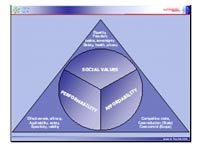Introduction
Until now, research in Public Health Genetics is either focused on the reconstruction of options for using genetics and genomics for public health purposes at the still developing intersection of science, medicine and societal health needs, or it is centred around concepts of policy development, or it is concerned with the normative evaluation and ethical questions stemming from the introduction of genetic information into the realm of public health. No research design so far aimed at a synthesis of analytical and pragmatic approaches dealing with these three fundamental aspects of Public Health Genetics so inextricably meshing with each other in the real world.
The Project “Public Health Genetics” (PHG) is addressing the specific shortcomings of this situation which are by and large typical for the problems of translating genomics research into strategies for medical problem solving on the level of real world applications. Within the framework of genetics and genomics applied to public health problems the platform will translate knowledge generated by the NGFN into novel public health politics and practice.
Project Status
The above mentioned goals require in-depth studies of the current situation (horizon scanning, monitoring, and fact finding) as the framework for our scope of action, and the safeguarding of values intrinsic to solidarity-based health care systems by fulfilling key criteria of social accountability (social values, performability, affordability). To reach these goals, the Project is aiming at, developing a transdisciplinary methodology of mutually dependent research areas dealing with the reconstruction and development of the given scope for action, and the normative evaluation and safeguarding of ethical issues in this molecular transition of public health. Currently, the reconstructive step of analysing the development and to some extent the normative evaluation have been funded.

Research Field: Predictive and Preventive Medicine and Public Health
Rational diagnosis and treatment are essential elements of modern medical problem solving. Nevertheless, assessing health related risks in order to effectuate rational prevention has always been the ideal of medicine. The concept of genetic information together with tools for susceptibility testing and genome-based identification of health related traits brought about novel approaches to the prediction of health conditions, fuelling the hope that finally more rational ways of preventing disease would become feasible. While genomics knowledge is becoming increasingly helpful for effective prevention on one hand, a huge number of non-rational, social, political and individual factors is involved in creating living conditions bearing consequences for human health on the other.
The concept of health-related risk is central to our understanding of how individual genetic traits and behaviors influence our future health conditions. In 1961 the “Framingham-Study” mentioned risk-factors for the first time as an inherent part of etiological knowledge. In the context of molecular medicine, however, risk is defined relative to specific genetic predispositions and susceptibilities are understood as inherited or acquired genetic traits of an organism leading to different degrees of readiness for developing diseases. In early predictive concepts of molecular medicine still rooted in genetic determinism, this formula had been used in a misleading way. The now accepted fact that susceptibility and the readiness for developing pathological processes are often a physiological reaction of the body in biologically coping with a pathogenic environment largely had been ignored. Thus, any potential biological advantage of predispositions, in this context expressed in genetic variety and the readiness to cope with specific conditions (e.g. sickle-cell/malaria), was rejected for the sake of the idea of an ideal genome.
While most approaches in genetic testing emancipated themselves in relatively short time from naïve genetic determinism and did come to grips with a more sophisticated notion of genetic predisposition, the intrinsically probabilistic nature of genetic susceptibility and risk continues to inflict more persistent problems on molecular medicine, Public Health Genetics, and the way it deals with the predictive value of genetic information. In predictive analyses of human genomic information genetic traits or dispositions are often equaled with risk. As a consequence, probabilistic concepts of genetic risk allowing for a statistical correlation between probability of the occurrence of a specific disease and patterns of genetic information in large numbers of individuals have often been used to determine individual genetic risks or susceptibilities. In this regard, probabilistic knowledge about the human genome has been confused with its individual function on the basis of both, inherited and acquired traits. As a consequence, the individual predictive value of genetic traits had been largely overestimated and induced false hopes in patients and practitioners seeking for better ways to control individual health risks by strategies tailored to specific genotypes or haplotypes.
Research Agenda: Development, Concepts, Normative Evaluation
The goal of research efforts in the project is to provide the NGFN with evidence-based and strategic and validated knowledge needed to translate basic research in to health care practice. For our health care system dealing with an ever ageing society (in 2030 roughly one third of the German population will 60 be years and older) curative medicine will soon reach a point where, due to financial restrictions, medically indicated and useful interventions will – unfortunately but inevitably – have to be rationed in one way or another. In this situation genomics knowledge can help to develop novel strategies of prediction and prevention for Public Health Genetics that will help to dodge the rationing of health care and rebuild health care services with a greater emphasis on preventive responsibilities on the individual and societal level. By the use of genomic (predictive) knowledge strategies of prevention and public health will be better targeted to specific populations at risk and medical (curative) interventions will be more focused on necessary than on desirable health care services. In the ongoing transformation of health care markets from economies of scale to economies of scope which is partially fueled by molecular medicine and medical genomics, Public Health Genetics will have a significant impact on effective and efficient health care.
The implementation of Public Health Genetics, however, is dependent on concomitant factors in the public sphere. Nevertheless, the project only can analyze the preconditions for the shaping of Public Health Genetics in Germany. An actual implementation will require a larger participatory process of medical, social, and political decision making.
In brief, the goals in mutually dependent and partly intersecting research areas are the following:
In the research area of development the platform Public Health Genetics will provide the tools for
- reconstructing the framework of public health as is with regard to problems that can be successfully addressed by genetics and genomics (horizon scanning and monitoring)
- generating knowledge about the applicability of developing technologies in the realm of public health (fact finding)
- projecting the scientific, medical and societal premises under which genetics and genomics can be applied to public health issues
- evaluating this knowledge with regard to applicability and desirability of Public Health Genomics in the German and European situation
In the area of normative evaluation the platform Public Health Genetics will
- explicate medically and socially robust criteria for the social accountability of Public Health Genetics in Germany (and Europe)
- gauge the impact of Public Health Genetic for the German health care system on the normative level
- develop a normative framework for distributive justice and enabling justice for Public Health Genetics
- come up with medically, ethically, and socially desirable concepts for the balancing of needs with regard to public and individual health
- determine ways of dealing with the increase of individualized strategies of diagnosis, treatment, and prevention in the area of genomics based molecular medicine
In order to facilitate the urgently needed transition from basic and academic research to the application of novel knowledge and tools in the realm of public health, one major goal of the project is to establish the “Public Health Genetics Resource Center (PHG-RC)”. The PHG-RC will collect genomics information such as correlations of genotypic information with phenotypes at risk in order to develop, conceptualize and evaluate concrete elements of disease prevention that can be integrated into the inventory of health care services under the premises of sustainability of our health care system. The PHG-RC will function as a national and international knowledge base for questions of Public Health in the era of genomics, including those of Health Technology Assessment (HTA), ethical, legal and social implications (ELSI), health care system reform, affordability of health care and policy making.
Outlook
Molecular concepts of prediction and prevention do have a potential to significantly improve our ability to control health risks if applied appropriately and according to their explanatory reach. In the light of informational and predictive approaches of molecular medicine with its specific scientific approach, health and disease undergo a profound redefinition. Health and disease need to be understood as concepts which are biological and social categories at the same time, incorporating various scientific, medical and social values. Thus, the redefinition of health and disease during the molecular transition of medicine brings about a number of social and ethical issues. Uncritical use of genetic information and premature application of novel powerful tools for genetic interventions in humans are raising public concern. Knowledge about specific genetic predispositions and susceptibilities is often seen as venture point of genetic discrimination. The possibility – and sometime the need – to perform a segmentation of patients according to specific genotypes raises additional social, ethical, and legal questions. Nowadays a plethora of these issues are negotiated in the hybrid forum of public and professional debates on medicine, ethics and society. However, focusing on highly detailed questions of immediate concern often turns out to be a major blocker of a deeper understanding of the ongoing changes in medicine and society. Beyond the discussion of particular social and ethical issues it must be understood that molecular medicine together with biosciences and biotechnology have turned into much broader endeavors than ever before, extending their domains to almost every aspect of (human) life.
Lit.: 1. Brand A, Dabrock P; Paul N, Schröder P.: Gesundheitssicherung im Zeitalter der Genomforschung, Friedrich Ebert Stiftung, Berlin 2004. 2. Burke W. et al.: Genetic Test Evaluation: Information Needs of Clinicians, Policy Makers, and the Public. American Journal of Epidemiology 2002 156 (4): 311-318. 3. Khoury M J et al. (Eds.): Genetics and Public Health in the 21st Century. Using Genetic Information to Improve Health and Prevent Disease. Oxford 2000. 4. Paul N W, Ganten D.: Die Zukunft der Molekularen Medizin. In Das genetische Wissen und die Zukunft des Menschen, Honnefelder, L. et al. (Eds.), 103–114, Berlin 2002. 5. Paul N W.: Auswirkungen der Molekularen Medizin auf Gesundheit und Gesellschaft. Gutachten Bio und Gentechnologie. Friedrich-Ebert-Stiftung, Berlin, 2003.


